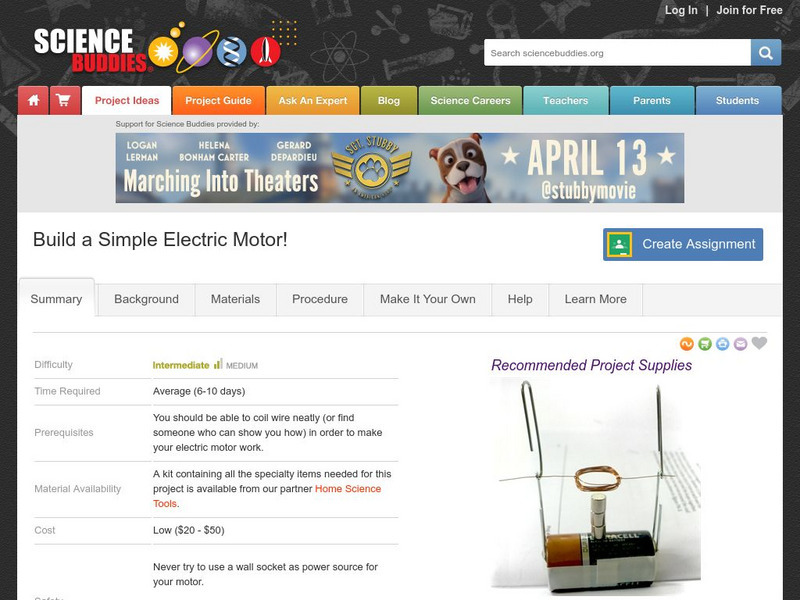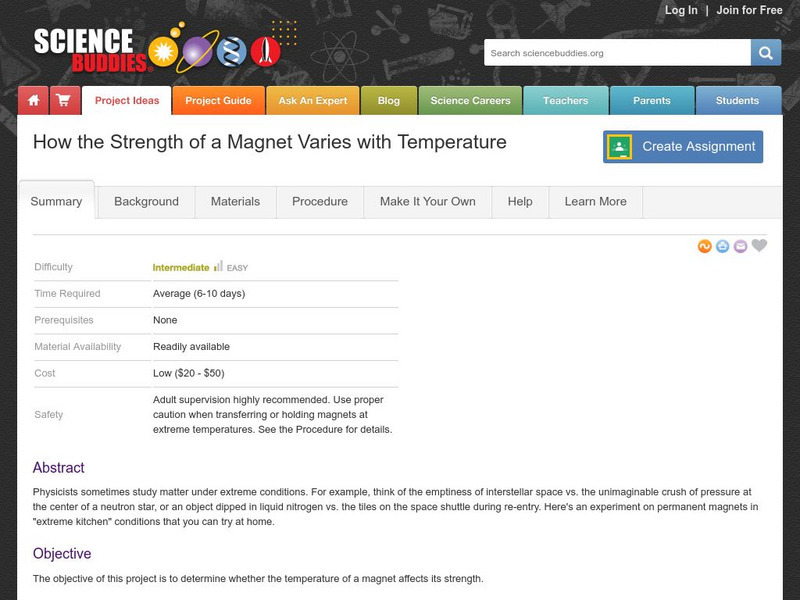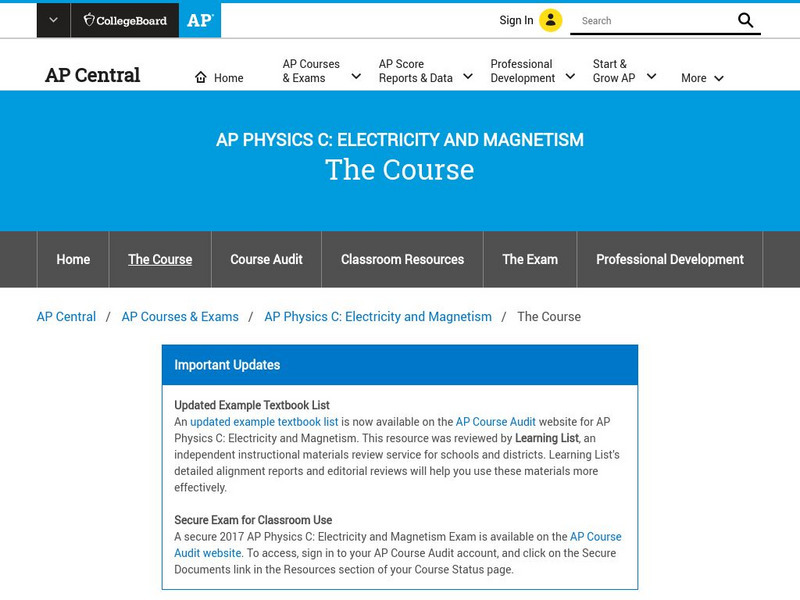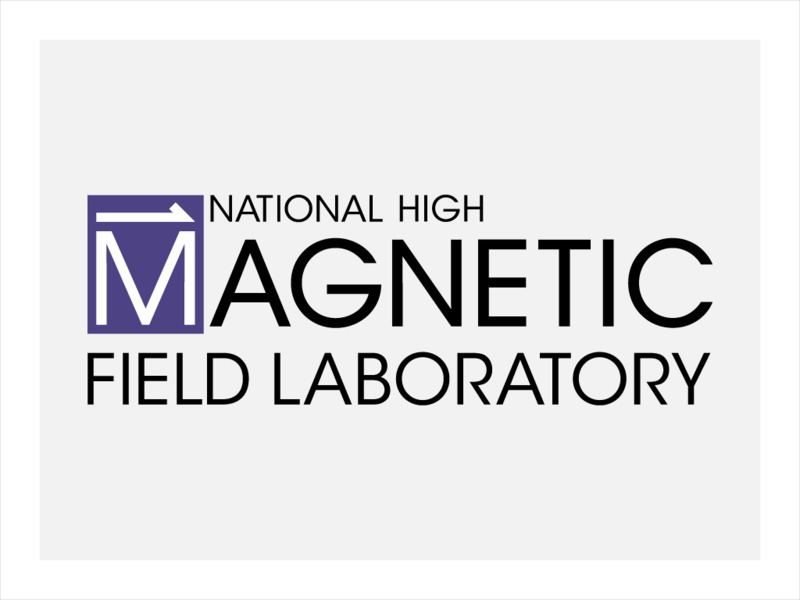Hi, what do you want to do?
Exploratorium
Exploratorium: Science Snacks: Physics/electricity & Magnetism
Exploratorium Science Snacks are miniature science exhibits and experiments that can be made with common, inexpensive, easily available materials. These electricity snacks represent a set of devices that you can build and experiment with...
Science Buddies
Science Buddies: Rock On! Recording Digital Data With Magnets
This is a straightforward project that shows you how data can be digitized and stored on magnetic recording media. You'll learn how alpha-numeric characters are digitized, and you'll use bar magnets to represent the individual data...
Science Buddies
Science Buddies: Spin Right 'Round With This Simple Electric Motor
If you put on clothes that were washed in a washing machine, rode in a car, ate food from a fridge, warmed up lunch in a microwave, or played a video game, you used an electric motor. Try this science fair project and you'll learn how to...
Science Buddies
Science Buddies: How the Strength of a Magnet Varies With Temperature
Physicists sometimes study matter under extreme conditions. For example, think of the emptiness of interstellar space vs. the unimaginable crush of pressure at the center of a neutron star, or an object dipped in liquid nitrogen vs. the...
Orpheus Books
Q Files: Electricity and Magnetism: Electric Charge
Learn how electric charges work and about Coulomb's Law, which is used to calculate the strength of an electric force.
National High Magnetic Field Laboratory
Magnet Academy: Timeline of Electricity and Magnetism: 1800 1819
Alessandro Volta invents the first primitive battery, discovering that electricity can be generated through chemical processes; scientists quickly seize on the new tool to invent electric lighting. Meanwhile, a profound insight into the...
The College Board
Ap Central: Ap Physics C: Electricity and Magnetism: The Course
CollegeBoard offers a page of resources for students and teachers of AP Physics C: Electricity and Magnetism. Find course and exam information, teaching resources, articles, and recommended links.
National High Magnetic Field Laboratory
Magnet Academy: Carl Friedrich Gauss
Although he is best known as one of the greatest mathematicians of all time, Carl Friedrich Gauss was also a pioneer in the study of magnetism and electricity. To facilitate an extensive survey of terrestrial magnetism, he invented an...
National High Magnetic Field Laboratory
Magnet Academy: Electricity Meter
When electricity became available to the masses, utilities needed meters to record customer usage. This early 20th century model resembles many in use today. (Java tutorial)
Exploratorium
Exploratorium: Science Snacks: Magnetic Pendulums
See how electricity and magnetism interact with this activity. Activity has students creating a current by swinging a copper coil through a magnetic field. The copper coil will start a second coil swinging as well.
National High Magnetic Field Laboratory
Magnet Academy: Wheatstone Bridge
This circuit is most commonly used to determine the value of an unknown resistance to an electrical current.
National High Magnetic Field Laboratory
Magnet Academy: Sulfur Globe 1660
In the 17th century, German scientist Otto von Guericke built and carried out experiments with a sulfur globe that produced static electricity.
Florida State University
Florida State University: Magnet Lab: What Is a Bus Room?
The MagLab's bus tunnel has an aluminum track, but it doesn't carry passengers: it carries electricity, up to 56 megawatts of it.
National High Magnetic Field Laboratory
Magnet Academy: Capacitor
A capacitor is similar to a battery in that both store electrical energy. But a capacitor can't actually produce new electrons; it only stores them.
National High Magnetic Field Laboratory
Magnet Academy: Felix Bloch (1905 1983)
Physicist Felix Bloch developed a non-destructive technique for precisely observing and measuring the magnetic properties of nuclear particles. He called his technique "nuclear induction," but nuclear magnetic resonance (NMR) soon became...
National High Magnetic Field Laboratory
Magnet Academy: Paul Lauterbur
Chemist Paul Lauterbur pioneered the use of nuclear magnetic resonance (NMR) for medical imaging. He developed a technique, now known as magnetic resonance imaging (MRI), in the early 1970s that involves the introduction of gradients in...
US Energy Information Administration
U.s. Eia Energy Kids: Energy Sources: Electricity
A basic description of electricity and the role it plays in everyday life.
Cosmo Learning
Cosmo Learning: Physics Ii: Electricity and Magnetism
A collection of video lectures from a fundamentals of physics course taught at Massachusetts Institute of Technology. The course is the second in the sequence and focuses on electricity and magnetism The videos feature topics on...
The Wonder of Science
The Wonder of Science: 3 Ps2 3: Electric and Magnetic Forces
Learn about cause and effect relationships of electric or magnetic interactions between two objects not in contact with each other.
Other
Magnet Lab: Physics Lessons by Science Joy Wagon
These physics lessons and tutorials are designed to be a resource for learning introductory level, algebra-based physics. Organization is by topic, but a search option is available for quickly finding specific information. Although most...
National High Magnetic Field Laboratory
Magnet Academy: Timeline of Electricity and Magnetism: 600 Bc 1599
Find out how humans discovered the magnetic lodestone as well as the attracting properties of amber. Advanced societies, in particular the Chinese and the Europeans, exploited the properties of magnets in compasses, a tool that makes...
National High Magnetic Field Laboratory
Magnet Academy: Electric Range 1892
From the Stone Age to today, the search is constantly underway for better, more efficient ways to cook food. Reflecting many of the advances in science and technology, the electric range has become a popular choice for homes and businesses.
National High Magnetic Field Laboratory
Magnet Academy: Schweigger Multiplier 1820
Spurred by Hans Christian Orsted's discovery of a relationship between electricity and magnetism, German chemist Julian Schweigger immediately began tinkering and soon came up with a very early galvanometer known as the Schweigger...
National High Magnetic Field Laboratory
Magnet Academy: Electrostatic Generator
Though simple by today's standards, the early electrostatic generators were a great milestone in humankind's understanding of electricity, allowing scientists to produce electricity so they could study it. (Java tutorial)
Other popular searches
- Electricity and Magnetism
- Electricity Magnetism
- Electricity/magnetism
- Electricity & Magnetism
- Electricity/magnetism Unit



























